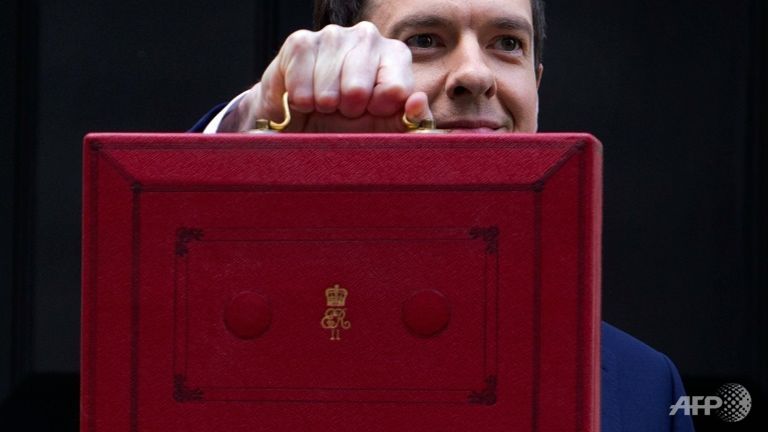Britain cuts taxes for price-hit North Sea oil industry
 |
| British Finance Minister George Osborne poses for pictures with the Budget Box as he leaves 11 Downing Street in London, on Mar 16, 2016, before presenting the government's annual budget to parliament. (AFP/Justin Tallis) |
LONDON: British finance minister George Osborne on Wednesday (Mar 16) announced fresh tax cuts to support the North Sea oil and gas industry, which has been reeling from the plunge in oil prices since mid-2014.
In his annual budget, Osborne revealed the government will cut a supplementary tax on oil industry profits from 20 per cent to 10 per cent in an attempt to protect jobs, mostly based in eastern Scotland.
"The oil and gas sector employs hundreds of thousands of people in Scotland and across our country," Osborne told parliament. "In my budget a year ago, I made major reductions to their taxes. But the oil price has continued to fall. So we need to act now for the long term," he added.
"I am today cutting in half the supplementary charge on oil and gas from 20 per cent to 10 per cent and I'm effectively abolishing petroleum revenue tax."
The supplementary charge only applies to companies involved in the exploration for, and production of, oil and gas in Britain. It is calculated in the same way as conventional business tax but with the addition of a "ring fence", which prevents such companies from using losses from other activities to reduce the payable levy.
Osborne had already reduced the rate from 30 per cent to 20 per cent at the last budget.
The Petroleum Revenue Tax is a tax on the profits from oil and gas production from fields that were approved before March 1993. It is currently set at 50 per cent, but was already due to fall to 35 per cent before Wednesday's announcement.
Osborne said the two measures would support "this key Scottish industry and "jobs right across Britain."
Oil and Gas UK, Britain's offshore oil and gas industry association, warned in its annual report last month that production of oil and gas in the North Sea could be halved in 10 years without new investment.
The lobby group linked the strong decline in investment to oil prices, which it said had plummeted by 70 per cent since 2014, and gas prices, which fell 20 per cent last year.
The government announced in January a £250 million (US$352 million) stimulus for the Scottish city of Aberdeen, at the heart of the North Sea energy industry.
The funding is expected to be used to help the oil and gas industry export its expertise globally as well as encouraging economic diversification in northeast Scotland.
What the stars mean:
★ Poor ★ ★ Promising ★★★ Good ★★★★ Very good ★★★★★ Exceptional
Latest News
More News
- Foreign leaders extend congratulations to Party General Secretary To Lam (January 25, 2026 | 10:01)
- Russian President congratulates Vietnamese Party leader during phone talks (January 25, 2026 | 09:58)
- Worldwide congratulations underscore confidence in Vietnam’s 14th Party Congress (January 23, 2026 | 09:02)
- Political parties, organisations, int’l friends send congratulations to 14th National Party Congress (January 22, 2026 | 09:33)
- 14th National Party Congress: Japanese media highlight Vietnam’s growth targets (January 21, 2026 | 09:46)
- 14th National Party Congress: Driving force for Vietnam to continue renewal, innovation, breakthroughs (January 21, 2026 | 09:42)
- Vietnam remains spiritual support for progressive forces: Colombian party leader (January 21, 2026 | 08:00)
- Int'l media provides large coverage of 14th National Party Congress's first working day (January 20, 2026 | 09:09)
- Vietnamese firms win top honours at ASEAN Digital Awards (January 16, 2026 | 16:45)
- ASEAN Digital Ministers' Meeting opens in Hanoi (January 15, 2026 | 15:33)
















 Mobile Version
Mobile Version